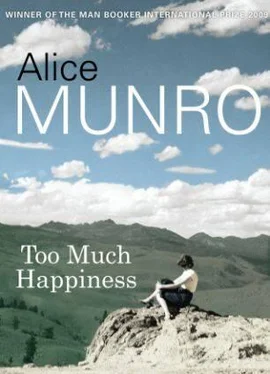Mrs. Sands was not like some of them. She was not brisk, not thin, not pretty. Not too old either. She was about the age that Doree’s mother would have been, though she did not look as if she’d ever been a hippie. Her graying hair was cut short and she had a mole riding on one cheekbone. She wore flat shoes and loose pants and flowered tops. Even when they were of a raspberry or turquoise color these tops did not make her look as if she really cared what she put on-it was more as if somebody had told her she needed to smarten herself up and she had obediently gone shopping for something she thought might do that. Her large, kind, impersonal sobriety drained all assaulting cheerfulness, all insult, out of those clothes.
“Well the first two times I never saw him,” Doree said. “He wouldn’t come out.”
“But this time he did? He did come out?”
“Yes, he did. But I wouldn’t hardly have known him.”
“He’d aged?”
“I guess so. I guess he’s lost some weight. And those clothes. Uniforms. I never saw him in anything like that.”
“He looked to you like a different person?”
“No.” Doree caught at her upper lip, trying to think what the difference was. He’d been so still. She had never seen him so still. He hadn’t even seemed to know that he would sit down opposite her. Her first words to him had been “Aren’t you going to sit down?” And he had said, “Is it all right?”
“He looked sort of vacant,” she said. “I wondered if they had him on drugs?”
“Maybe something to keep him on an even keel. Mind you, I don’t know. Did you have a conversation?”
Doree wondered if it could be called that. She had asked him some stupid, ordinary questions. How was he feeling? (Okay.) Did he get enough to eat? (He thought so.) Was there anyplace where he could walk if he wanted to? (Under supervision, yes. He guessed you could call it a place. He guessed you could call it walking.)
She’d said, “You have to get fresh air.”
He’d said, “That’s true.”
She nearly asked him if he had made any friends. The way you ask your kid about school. The way, if your kids went to school, you would ask them.
“Yes, yes,” Mrs. Sands said, nudging the ready box of Kleenex forward. Doree didn’t need it; her eyes were dry. The trouble was in the bottom of her stomach. The heaves.
Mrs. Sands just waited, knowing enough to keep her hands off.
And, as if he’d detected what she was on the verge of saying, Lloyd had told her that there was a psychiatrist who came and talked to him every so often.
“I tell him he’s wasting his time,” Lloyd said. “I know as much as he does.”
That was the only time he had sounded to Doree anything like himself.
All through the visit her heart had kept thumping. She’d thought she might faint or die. It costs her such an effort to look at him, to get him into her vision as this thin and gray, diffident yet cold, mechanically moving yet uncoordinated man.
She had not said any of this to Mrs. Sands. Mrs. Sands might have asked-tactfully-who she was afraid of. Herself or him?
But she wasn’t afraid .
When Sasha was one and a half, Barbara Ann was born, and, when Barbara Ann was two, they had Dimitri. They had named Sasha together, and they made a pact after that that he would name the boys and she would name the girls.
Dimitri was the first one to be colicky. Doree thought that he was maybe not getting enough milk, or that her milk was not rich enough. Or too rich? Not right, anyway. Lloyd had a lady from the La Leche League come and talk to her. Whatever you do, the lady said, you must not put him on a supplementary bottle. That would be the thin edge of the wedge, she said, and pretty soon you would have him rejecting the breast altogether.
Little did she know that Doree had been giving him a supplement already. And it seemed to be true that he preferred that-he fussed more and more at the breast. By three months he was entirely bottle-fed, and then there was no way to keep it from Lloyd. She told him that her milk had dried up, and she’d had to start supplementing. Lloyd squeezed one breast after the other with frantic determination and succeeded in getting a couple of drops of miserable-looking milk out. He called her a liar. They fought. He said that she was a whore like her mother.
All those hippies were whores, he said.
Soon they made up. But whenever Dimitri was fretful, whenever he had a cold, or was afraid of Sasha’s pet rabbit, or still hung on to chairs at the age when his brother and sister had been walking unsupported, the failure to breast-feed was recalled.
The first time Doree had gone to Mrs. Sands’s office, one of the other women there had given her a pamphlet. On the front of it was a gold cross and words made up of gold and purple letters. “When Your Loss Seems Unbearable…” Inside there was a softly colored picture of Jesus and some finer print Doree did not read.
In her chair in front of the desk, still clutching the pamphlet, Doree began to shake. Mrs. Sands had to pry it out of her hand.
“Did somebody give you this?” Mrs. Sands said.
Doree said, “Her,” and jerked her head at the closed door.
“You don’t want it?”
“When you’re down is when they’ll try to get at you,” Doree said, and then realized this was something her mother had said when some ladies with a similar message came to visit her in the hospital. “They think you’ll fall on your knees and then it will be all right.”
Mrs. Sands sighed.
“Well,” she said, “it’s certainly not that simple.”
“Not even possible,” Doree said.
“Maybe not.”
They never spoke of Lloyd in those days. Doree never thought of him if she could help it, and then only as if he were some terrible accident of nature.
“Even if I believed in that stuff,” she said, meaning what was in the pamphlet, “it would be only so that…” She meant to say that such a belief would be convenient because she could then think of Lloyd burning in hell, or something of that sort, but she was unable to go on, because it was too stupid to talk about. And because of the familiar impediment, that was like a hammer hitting her in the belly.
· · ·
Lloyd thought that their children should be educated at home. This was not for religious reasons-going against dinosaurs and cavemen and monkeys and all that-but because he wanted them to be close to their parents and to be introduced to the world carefully and gradually, rather than thrown into it all at once. “I just happen to think they are my kids,” he said. “I mean, they are our kids, not the Department of Education’s kids.”
Doree was not sure that she could handle this, but it turned out that the Department of Education had guidelines, and lesson plans that you could get from your local school. Sasha was a bright boy who practically taught himself to read, and the other two were still too little to learn much yet. In evenings and on weekends Lloyd taught Sasha about geography and the solar system and the hibernation of animals and how a car runs, covering each subject as the questions came up. Pretty soon Sasha was ahead of the school plans, but Doree picked them up anyway and put him through the exercises right on time so that the law would be satisfied.
There was another mother in the district doing home-schooling. Her name was Maggie, and she had a minivan. Lloyd needed his car to get to work, and Doree had not learned to drive, so she was glad when Maggie offered her a ride to the school once a week to turn in the finished exercises and pick up the new ones. Of course they took all the children along. Maggie had two boys. The older one had so many allergies that she had to keep a strict eye on everything he ate-that was why she taught him at home. And then it seemed that she might as well keep the younger one there as well. He wanted to stay with his brother and he had a problem with asthma, anyway.
Читать дальше












